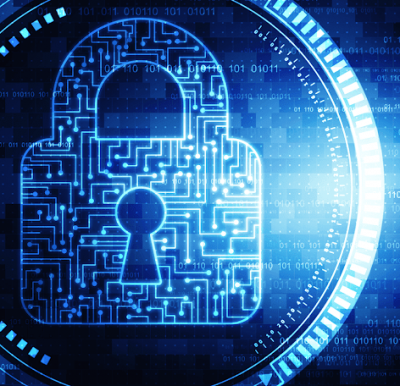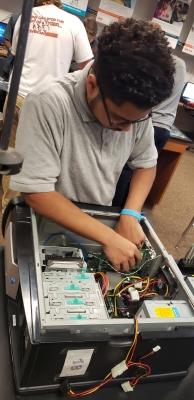Project Description

In Networking & Cyber Security we start with the fundamentals of computer hardware and software. We then move onto concepts in cyber security, networking, the responsibilities of an IT professional and Linux. Upon completion of year one students are ready to take the CompTIA A+ Certification and start a career in IT. Second Year Networking & Cyber Security students focus on Cybersecurity Operations and Networking. At the end of year two students can take the CCNA Cyber Operations certification exam to advance their career in the Information Technology Sector.

In Networking & Cyber Security we start with the fundamentals of computer hardware and software. We then move onto concepts in cyber security, networking, the responsibilities of an IT professional and Linux. Upon completion of year one students are ready to take the CompTIA IT Fundamentals+ (ITF+) and CompTIA A+ Certification and start a career in IT.
Every career has a path, and some are more defined than others. In medicine, for example, you complete medical school and a residency before getting a job as a doctor. In IT, that path is not as cut and dry, and some people bounce around from one area to another. No matter what IT role you aspire to, there’s a foundational set of skills that will set you up for success, and those skills are validated by CompTIA’s core skills certifications: CompTIA IT Fundamentals+ (ITF+), CompTIA A+, CompTIA Network+ and CompTIA Security+. These certifications focus on specialist roles to help you become a well-rounded IT professional that can move into whatever career path you choose.
1st Year Students
As the industry standard for getting a technical support job and establishing an IT career, CompTIA A+ goes beyond PC repair. It prepares students to troubleshoot and problem solve a wide variety of issues, from networking and operating systems to mobile devices and security. It truly is a stepping stone to careers in infrastructure, cybersecurity and more.
People who have CompTIA A+ can complete the following tasks:
- Configure, install and upgrade operating systems, including Windows, Apple OS X, Linux, iOS, Android and Windows Mobile
- Install and image virtual machines
- Set up and troubleshoot peripheral devices
- Assemble and disassemble computing hardware
- Set up and support basic home and small office networks
- Implement cybersecurity controls appropriate to help desk and technical support roles
- Troubleshoot and support end-user access to applications and data
CompTIA A+ goes beyond training to map skills and knowledge to job roles including service desk analyst, help desk tech, technical support specialist, field service technician, associate network engineer, data support technician, desktop support administrator, end-user computing technician and system support specialist.
Introduction to Networks and Cyber Security are the other two areas of focus as a Year 1 Networking and Cyber Security student that provide both foundational information for year 2 and college credit through CTAG’s.
Introduction to Networks
Begin preparing for a networking career with this introduction to how networks operate. This first course in the 3-course CCNA series introduces architectures, models, protocols, and networking elements – functions needed to support the operations and priorities of Fortune 500 companies to small innovative retailers. You’ll even get the chance to build simple local area networks (LANs). Developing a working knowledge of IP addressing schemes, foundational network security, you’ll be able to perform basic configurations for routers and switches. No prerequisites required. After completing all three CCNA courses, you are ready to take the CCNA Certification.
You’ll Learn These Core Skills:
- Build simple LANs, perform basic configurations for routers and switches, and implement IPv4 and IPv6 addressing schemes.
- Configure routers, switches, and end devices to provide access to local and remote network resources and to enable end-to-end connectivity between remote devices.
- Develop critical thinking and problem-solving skills using real equipment and Cisco Packet Tracer.
- Configure and troubleshoot connectivity a small network using security best practices.
Cyber Security
Learn the Basics Needed to Fight Cybercrime!
A single breach can have huge consequences for a company, hurting the bottom line and causing disruption in the daily lives of millions of people. That is why the demand for security professionals continues to grow. Get onboard—and develop an understanding of cybercrime, security principles, technologies, and procedures used to defend networks. Then decide whether you want to pursue an entry-level networking or security professional role. Recommended if you plan to study for CCNA or CyberOps Associate Certifications.
You’ll Learn These Core Skills:
- Understand security controls for networks, servers and applications.
- Learn valuable security principals and how to develop compliant policies.
- Implement proper procedures for data confidentiality and availability.
- Develop critical thinking and problem-solving skills using real equipment and Cisco Packet Tracer.
2nd Year Students

Today, emboldened cyber-criminals are tapping into legitimate online resources. They leach server capacity, steal data, and demand ransoms from online victims whose information they hold hostage. The explosive growth in Internet traffic-driven largely by faster mobile speeds and the proliferation of online devices- works in their favor by helping to expand the attack surface. Facing mounting challenges from cybercrime, cyberespionage, insider threats, and advanced persistent threats, organizations are establishing SOC teams of security professionals who can monitor, detect, and respond rapidly to security incidents before they cause damage.
Will You Answer the Call to Protect Networks?
Uncovering cybercrime, cyber espionage, and other networking threats are just some of the exciting cybersecurity jobs spanning across every industry. Learn the skills to join this fast-growing field and take advantage of the opportunities found in security operation centers. Feel confident that you are helping make the world a safer place by pursuing a role in this field.
In this course you will learn security concepts, security monitoring, host-based analysis, network intrusion analysis, and security policies procedures. This course also aligns with the National Initiative for Cybersecurity Education (NICE) Cybersecurity Workforce Framework to support consistent communication language for cybersecurity education, training, and workforce development.
 With networking the backbone of everything connected to the internet students need to understand how networks are designed, installed and configured. The Switching, Routing, and Wireless Essentials networking course focuses on switching technologies and router operations that support small-to-medium business networks, including wireless local area networks (WLAN) and security concepts. In this second course in a 3-course CCNA series you’ll perform basic network configuration and troubleshooting, identify and mitigate LAN security threats, and configure and secure a basic WLAN. This is the second of three CCNA courses you need to take to be ready to take the CCNA Certification.
With networking the backbone of everything connected to the internet students need to understand how networks are designed, installed and configured. The Switching, Routing, and Wireless Essentials networking course focuses on switching technologies and router operations that support small-to-medium business networks, including wireless local area networks (WLAN) and security concepts. In this second course in a 3-course CCNA series you’ll perform basic network configuration and troubleshooting, identify and mitigate LAN security threats, and configure and secure a basic WLAN. This is the second of three CCNA courses you need to take to be ready to take the CCNA Certification.
You’ll Learn These Core Skills:
Work with routers, switches and wireless devices to configure and troubleshoot VLANs, Wireless LANs and Inter-VLAN routing.
Configure and troubleshoot redundancy on a switched network using STP and EtherChannel.
Develop critical thinking and problem-solving skills using real equipment and Cisco Packet Tracer.
Explain how to support available and reliable networks using dynamic addressing and first-hop redundancy protocols.
At the end of the program students can continue the routing and switching curriculum at North Central State College and then be ready to take their CCENT certification and then continue on to complete their CCNA certification.
Industry Recognized Credentials that can be earned in this program:
CompTIA IT Fundamentals+ (ITF+)
CompTIA A+ Certification
Cisco Certified CyberOps Associate Certification
College Credit that can be earned in this program (CTAG’s):
CTIT017 Cisco I: CCNA 7 – Introduction to Networks – Credits: 3-4 Semester Hours
CTIT018 Cisco II: CCNA 7 – Switching, Routing, and Wireless Essentials (SRWE) – Credits: 3-4 Semester Hours
CTIT014 PC Operating System, Hardware Operation and Maintenance/A+ – Credits: 3 Semester Hours
Up To Date Curriculum
We are an Cisco Networking Academy. As the world changes all around us, acquiring technical skills is what brings opportunity and the promise of education is what offers hope. We teach and nurture these world changers of tomorrow, these global problem solvers? Together with Cisco training and partners we’ve made a commitment to developing the workforce of the future. Join us as we change the world – one student at a time.
An incredible opportunity is waiting for you. Technology is changing the world by connecting billions of devices and improving how we live, work, play and treat our planet. No industry is immune. Are you ready to change your life, and possibly make the world a better place?
CompTIA A+
As the industry standard for getting a technical support job and establishing an IT career, CompTIA A+ goes beyond PC repair. It prepares candidates to troubleshoot and problem solve a wide variety of issues, from networking and operating systems to mobile devices and security. It truly is a stepping stone to careers in infrastructure, cybersecurity and more.
People who have CompTIA A+ can complete the following tasks:
- Configure, install and upgrade operating systems, including Windows, Apple OS X, Linux, iOS, Android and Windows Mobile
- Install and image virtual machines
- Set up and troubleshoot peripheral devices
- Assemble and disassemble computing hardware
- Set up and support basic home and small office networks
- Implement cybersecurity controls appropriate to help desk and technical support roles
- Troubleshoot and support end-user access to applications and data
CompTIA A+ goes beyond training to map skills and knowledge to job roles including service desk analyst, help desk tech, technical support specialist, field service technician, associate network engineer, data support technician, desktop support administrator, end-user computing technician and system support specialist. If you’re thinking about getting CompTIA A+, CompTIA A+ On-Ramp is a great way to get started.
CCNA Cyber Ops
The rising demand for trained and experienced cybersecurity operations professionals Industry studies show that the average time to detect a cybersecurity breach, rather than in days or weeks, is measured in months. The number and cost of security breaches continue to rise, as do regulatory penalties for organizations suffering a data breach. Facing mounting challenges from cybercrime, cyberespionage, insider threats, and advanced persistent threats, organizations are establishing security operation center teams of security professionals who can monitor, detect, analyze, and respond rapidly to protect
systems from cybersecurity risks, threats, and vulnerabilities.
Because static security controls cannot catch 100 percent of cybersecurity threats and issues, SOC teams play a critical role in an organization’s protection. With the increasing number of cybersecurity-related jobs, organizations continue to struggle with finding or developing cybersecurity talent, and are paying a premium for qualified individuals who can fill those roles.
Cybersecurity is among the top 10 technology trends impacting hiring in the IT industry. The CCNA Cyber Ops certification program provides a valuable first step in acquiring the knowledge and skills needed to work with a SOC team, and can be a valuable part of beginning a career in the exciting and in-demand field of cybersecurity operations.
